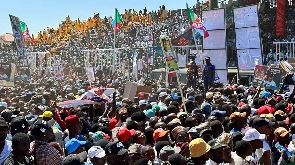Nigerian President Muhammadu Buhari has launched campaigns for the ruling All Progressives Congress (APC) party ahead of the February 2023 general election, with a call for a fair contest and making every vote count.
On Tuesday, President Buhari joined party supporters at the Jos township stadium in endorsing Mr Bola Tinubu, 70, as the party’s flag bearer.
Mr Buhari told Nigerians that democracy must be advanced and pledged that “no election winner will be denied his mandate, irrespective of the party to which they belong”.
While handing over the APC’s flag to the presidential candidate, President Buhari urged party members to rally behind its candidate who had been unanimously agreed upon by party leaders.
He said Nigeria needs a man like Tinubu, a former two-time governor of Lagos state and currently a national leader of the party.
Campaign on issues
He urged the party members to campaign on issues and the abilities of “our candidate and his running mate, Mr Kashim Shettima” and reiterated his assurances to be at the forefront of the campaign because he believed in the party.
The Nigerian president said it is only the APC that can steer the country to fulfil its historic purpose, adding that by working together with the leadership of the party, the campaign council, and its teeming supporters, the goal will be achieved.
Mr Tinubu, a popular politician from the south who won the APC presidential ticket with a landslide, said he was aware of the challenges young people are encountering, promising that these would be a thing of the if he becomes president.
“To the youth, we make a promise that today may be difficult but we will not let you down because you are our children and brothers.
“I am not a happy man until I free you from the bondage of neglect and give you the skills, because I know you can do it,” he said.
Build on Buhari’s achievements
He said that he would build on President Buhari’s achievements in the last seven years in infrastructure and a solid foundation for the development of agriculture and other sectors.
“Nigeria was sinking but Buhari pulled us out and said that Nigeria will not sink in his time and in the time of the APC,” Mr Tinubu said.
He called on Nigerians to vote for the APC, which he said is the surest way to prosperity for the country.
Eighteen candidates are contesting in the presidential election, which will be held on February 25, 2023.
In the general election, 109 senators, 499 members of the House of Representatives, state governors and members of state houses of assembly will be elected.
As the official campaigns kicked off as directed by the Independent National Electoral Commission (INEC), four presidential candidates are in the race. They include 75-year-old Atiku Abubakar, a former two-time vice president of the opposition Peoples Democratic Party (PDP), which was ousted by APC in 2015.
Another candidate, 66-year-old Rabi'u Musa Kwankwaso, who was the governor of Kano state from 1999 to 2003 and from 2011 to 2015, and who is running for the New Nigeria Peoples Party, is rated highly in the country’s north.
On the Labour Party banner is 61-year-old Gregory Peter Obi, a former governor in South East Anambra state, and who is popular with the youth. He defected from PDP in May 2022 in the heat of the very contentious party primary, which he considered unfair.
Obi, who was Atiku’s running mate in the 2019 presidential election, is making a wave in the south and southeast Nigeria and among many Christians and youth whose slogan is “reclaiming the country”.
Economic and security problems
All the frontline candidates are promising to bail Nigeria out of its present economic and security problems including inflation that has hit an all-time high of 20 per cent, more than 40 percent unemployment, scarcity of petroleum products and a high rate of poverty, with many people living below $1 daily.
Insecurity remains a huge problem as Boko Haram and ISWAP terrorists continue to dominate the landscape since 2009, leading to the deaths of more than 60,000 people, with more than 2.1 million others being displaced.
The emergence of bandits has further compounded the poor security situation in the country. Bandits are taking over villages, abducting people for ransom and levying taxes on poor farmers.
Africa News of Wednesday, 16 November 2022
Source: theeastafrican.co.ke

















